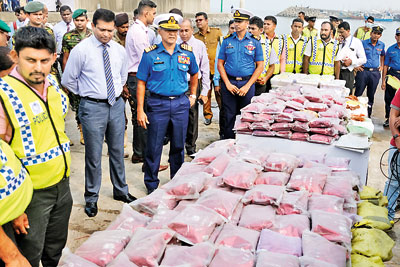News
Booze, drugs and smokes sales tear gaping hole in lockdown

A haul of heroin concealed in rice bags. Pic by Amila Gamage
The rippling effect of the COVID-19 virus that paralysed households, restricting daily life and even the purchase of basic foods, caused no apparent upset to the supply chain for drugs, alcohol and tobacco, with addicts being able to buy their daily dose with surprising ease.
During the lockdown period the availability of alcohol and tobacco continued, with several businesses using social media to advertise the availability of the products.
Desperate consumers were happy to pay exorbitant prices for their regular quotas, which were dispatched to their doorsteps.
Drug users purchased their fix each day from popular joints that dared selling the illegal substances despite the curfew.
A former addict, on condition of anonymity, said heroin had been sold at Rs. 1,000 a packet in hotspots in Moratuwa, Modera and Thotalanga in shady joints under very eyes of law enforcement, which looked the other way.
The National Authority on Tobacco and Alcohol (NATA), the body responsible for the control of tobacco and alcohol consumption in the country, said there were copious advertisements in social media selling foreign and local liquor and cigarettes.
Chairman Dr. Samadhi Rajapaksa said Facebook, WhatsApp and other social media were used. Recipes were uploaded depicting methods of distilling the local liquor, kasippu, in home kitchens and backyards. The methods went viral on Facebook, with some people even distilling the stuff in rice cookers.
In addition, short films portraying film characters drinking and smoking were uploaded, intensifying the cravings of addicts.
“This is a violation of the NATA Act. The problem was that everybody could upload anything on social media platforms. We took prompt action through the National Centre for Cybersecurity to stop such activities and are also revisiting the NATA Act to bring in amendments prohibiting such behaviour,” Dr. Rajapaksa said.
Licensed wine shops and supermarkets that sold liquor joined the fray, selling liquor online and through the back door.
Transcending these regrettable happenings, records show hotlines were used by addicts seeking the opportunity, during a time of reflection under curfew, to quit.
The NATA emergency hotline, 0714227660, was flooded with calls. The special hotline set up for people seeking help received up to 60-75 calls a day compared to the usual 10-15 calls during pre-coronavirus times. Around 2,500 calls were received in the 57 days the country was in lockdown; of this, 51 per cent were smokers who wanted to quit.
“Most of them were seeking information on how to quit smoking or to manage withdrawal symptoms,” Dr. Rajapaksa said.
The closure under curfew of the 900 wine shops in the country cost the state Rs. 25 billion in excise tax. Illegal traders have cashed in on the trade lost to excise tax, taking in about 10 per cent (Rs. 2.5 billion) of business.
The Excise Department, in countrywide raids carried out during six weeks of lockdown, detected 3,079 cases of illicit liquor-distilling and related cases.
The Police Narcotics Bureau, in multiple police operations starting on March 20, seized 800kg of heroin.
On May 14, in another haul, 226kg of heroin was seized and four suspects arrested in Welisara. The drugs were concealed in rice bags and transported by men using “Essential Service” badges.
In early April, 14 drug addicts were found among those tested positive for COVID-19 at Suduwela, Ja-Ela in army operations. The clusters they created have led to several army personnel still being infected.
Police Narcotics Bureau DIG Sajeewa Medawatte said several drug addicts who had broken curfew had been rounded up and directed to seek help from the National Dangerous Drug Control Board (NDDCB).
A police officer said the curfew violators had not been arrested as police were worried that contact with the addicts could lead to officers being infected, similar to the problem encountered in the Suduwela incident.
The NDDCB received up to 12,000 calls on its special hotline, 0710301301, in the first 50 days of the lockdown period commencing on March 20. Most of the calls came from the Colombo, Gampaha, Kalutara, Kandy and Galle districts. Most callers were parents and family members who sought help to ease the suffering of addicts experiencing withdrawal symptoms sans their daily dose of drugs.
The board’s Chairman, Dr. Laknath Welagedera, said the 24-hour hotline connected to the nine provinces were attended by counsellors who gave information to callers on how best they could manage the sickness while confined to home.
Severe cases were referred to the nearest hospital with psychiatric units. Addicts needing rehabilitation were sent to centres in Thalangama, Nittambuwa, Galle and Kandy.
In addition, 24 outreach officers and counsellors working with the collaboration of grama sevaka niladharis were assigned to high-prevalence areas around the country to identify drug users and treat them.
There are 100,000 heroin and 400,000 cannabis addicts in the country, NDDCB statistics reveal.

